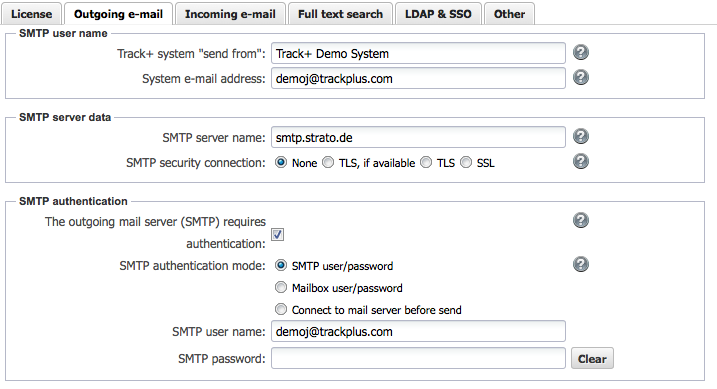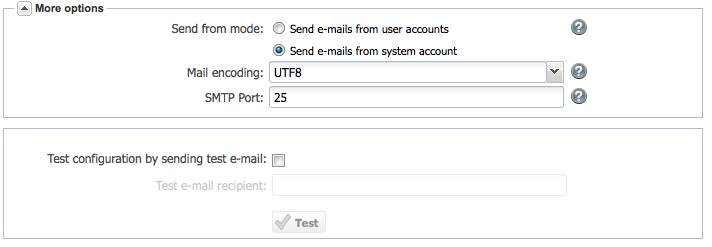Outgoing Email Connection#
Allegra can notify users by email when there have been important events in the system that are of interest to the user. For this, Allegra must be connected to an SMTP server, just like a standard email program like Thunderbird or Outlook.

The Allegra system can send emails to its users. For all system-generated emails, such as reminder emails or password emails, Allegra uses its own email address as the sender address (“Sent from”).
For user-triggered emails, such as when changing an item, you can decide whether to use the email address of the respective user or the Allegra system address as the sender address. You must use the Allegra system address if responses to your own emails are to be added as comments to items.
If you do not want to enable submission of items via email, this email address does not necessarily have to have a real email inbox, a fictitious “virtual” email address is sufficient.
If you want to allow items to be created by email, a real email inbox must be linked to the Allegra system email address.
All emails directly from the Allegra system will have the Allegra system email address as the “from” address and the server’s name as “from”. For example, such an email would come from “Your Server” <yourserver@yourdomain.com>.
SMTP Server Name#
To send emails, Allegra needs access to an SMTP email server. This email server can be on the same machine as Allegra, or it can be placed anywhere as long as it can be reached directly. For example, it is quite possible to use an SMTP server on the internet.
Typically, you would enter the same parameters here that you use in your regular email client software. You should not use the same account as this can lead to access conflicts depending on the authentication scheme you use.
Encrypted Connections#
You can use an encrypted connection between your Allegra server and your SMTP email server. You can choose between “SSL”, “TLS” and “TLS if available”.
For encrypted connections, you must first import a certificate from your SMTP server into the local keystore of your Allegra server. How to do this is explained under “Using SSL and TLS Encryption on Email and LDAP Connections”.
SMTP Authentication#
Allegra offers four ways to authenticate with an SMTP server:
No authentication
With a special username and password for the SMTP server
With the same username and password as for the incoming mailbox server
By first connecting to the incoming mailbox server
SMTP Username and Password#
Many SMTP servers require user authentication before they can send anything. Some company intranet SMTP servers may have been configured to be used without authentication. If you need to authenticate with a user/password combination on your SMTP server, enter your username and password here.
Click on the “Delete” button to delete the password. If you don’t enter a password, the old one will be retained. WARNING: Some SMTP servers do not allow the “From” address to not match the SMTP username. In this case, you are forced to check the “Use Allegra from-address” checkbox.
Mail Encoding#
Allegra can send emails in a variety of encodings. Here, you set the encoding to match your users. By now, almost all mail clients support Unicode (UTF8 encoding). This encoding works with any language. The setting here is usually the same as in your email client setting. For Western languages, “ISO-8859-1” usually works well.

SMTP Server Port#
Normally, it is advisable to leave the standard port set (25) as many SMTP servers use this port. If your SMTP server is outside your company intranet, the firewall must be open to allow traffic on the port configured here. If you are using an SSL or TLS encrypted connection, the standard port is 465.
Send Emails from the System or User Account#
For events generated by users, Allegra can send emails either under the user’s name (e.g. from: “Joe.Doe@doeJones.com”) or under its own email address (e.g. from: “Tracksystem@doeJones.com”). You can set this parameter as desired. However, some SMTP servers require that the “From” address matches the SMTP username. In this case, you are forced to check this box.
Test Configuration#
You can enter your email address in the provided field and send an email from Allegra to check if the configuration works.
Limiting the Number of Connections#
Some SMTP servers only accept a few connections from the same client. To limit the number of simultaneous SMTP connections from Allegra, set the following property in the advanced properties (tab “Miscellaneous > Edit Advanced Settings”):
maxNoOfSMTPConnections=10
You must restart the server after this change.
